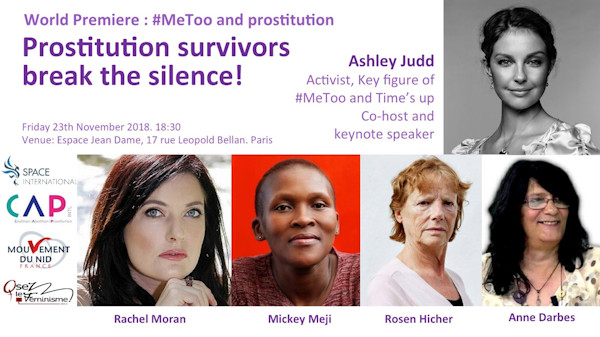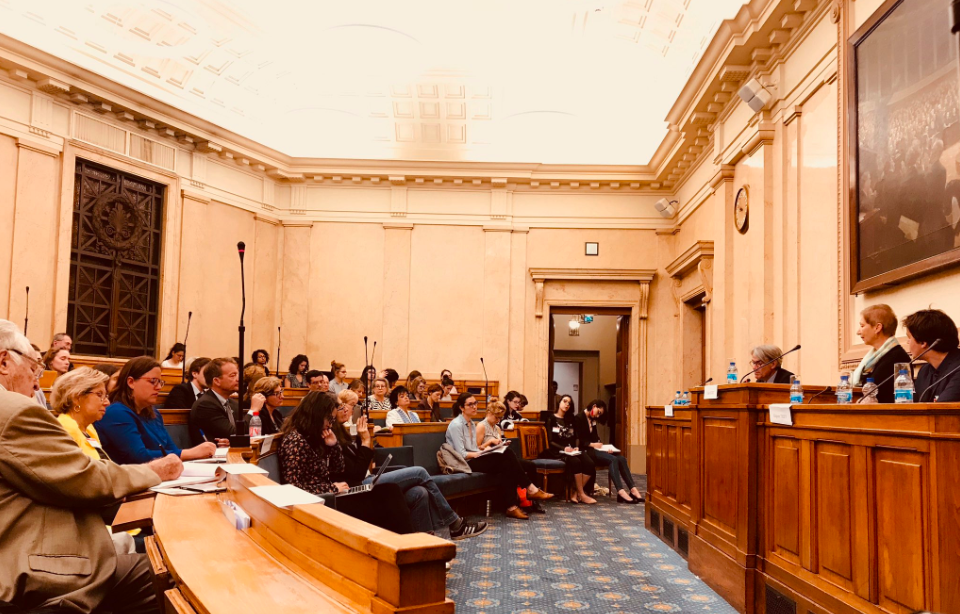New York: Remarks by Ruchira Gupta, Founder, Apne Aap, regarding United Nations Global Plan of Action to Combat Trafficking in Persons
Remarks by Ruchira Gupta, Founder, Apne Aap, at the informal interactive multi-stakeholder hearing in support of the preparatory process towards the high-level plenary meeting on the appraisal of the United Nations Global Plan of Action to Combat Trafficking in Persons on 23, June, 2017 at Conference Room 4, UN HQ.
Ruchira Gupta is the founder of Apne Aap Women Worldwide, one of CAP’s member organisations in India.
Thank you, Your Excellencies and distinguished guests for giving me the opportunity to speak on behalf of the 20,000 women and girls at risk to or trapped in prostitution in India, who are members of my organization, Apne Aap Women Worldwide. Our organization has been working for nearly two decades to prevent the trafficking of the children of prostituted women, and to create rehabilitation opportunities and exit strategies for those who are victims and survivors of sex-trafficking. At the same time, we have been going after sex-trafficking rings in India and have succeeded in securing the conviction of 66 sex-traffickers. We have worked with the government of India to create better laws and policies including the first definition of trafficking in the Indian law-Section 370 of the I.P.C based on the UN Protocol and the UN Global Plan of Action to combat trafficking.
We address both the supply and demand side of trafficking. We believe that trafficking is a demand driven industry driven by those who buy sex and those who make a profit out of selling the bodies of girls and women for sex.
The traffickers abuse the vulnerabilities of little girls who are poor, female and low-caste. Most of them are teenagers between the ages of 9 and 13. Their lives are marked by absence of choices.
Typically, a trafficker goes into a village or slum in India and seduces, tricks, forces or even tells the parents of these young girls that prostitution will guarantee their daughters two meals a day and a place to sleep. To the horrors of these little girls, they’re suddenly taken away from their families of love and compassion, and brought to communities where they are raped by 8-10 men every night.
This morning you heard an American survivor who spoke of the horrors of sexual exploitation that she has faced in America, and it is no different in India. For 4-6 years, these girls are repeatedly subjected to sexual exploitation. Finally, when they are of no value, they are thrown out to die on the sidewalk, disease-ridden with 2 or 3 children.
I call these girls “Last Girls”. They are the most vulnerable of human beings because not only does their intertwining inequalities of class, sex, age, caste, race, ethnicity and religion cut them off from basic needs like food, housing, health care, and education but also from legal protection and access to justice.
This is especially relevant today, when, we are thinking about combating the trafficking of persons in the context of the 2030 Sustainable Development Goals. There are 17 goals. Every single of the goals has to be addressed to ensure that the ‘Last Girl’ is not vulnerable to traffickers and that traffickers cannot abuse their position of power to take advantage of her vulnerability. Especially 5.2.
We need to imagine the 13-year old in a brothel, that little girl in a slum who is completely impoverished or disenfranchised in India – or that girl who was born to a black family in America or a Native American family in Canada, or as a minority ethnicity in Latin America. These girls from distinct socio-economic and ethnic backgrounds are marked by their vulnerabilities in the face of a vicious demand for trafficked persons, especially for the purpose of sexual exploitation or prostitution. Traffickers know that there is profit, so they go around looking for such girls who are the poorest of the poor.
So far development frameworks have focused on SMART goals-specific, measurable, achievable, results-oriented and time-bound. Sometimes this fails to recognize the needs of the last girls. She needs wrap around services like food, housing and education not just one specific thing like a condom, the quality of her services are as important- even if intangible-as that which can be measured or is quantitative, like well-being or a sense of safety, what we want for her cannot be the lowest-hanging fruit but her basic needs, it cannot be based on quick results but sustainable outcomes, and is cannot be time-bound, it has to be life-long for the “last girls,” because there will always be a last girl somewhere.
Our challenge is that we have to create systems to reach that girl. Once these systems are created to address the vulnerabilities of the most marginalized girls, and protect the “last girls” from their abusers, we create a world in which no human being is bought or sold.
We cannot settle for harm reduction solutions which are led by those who think that if a girl is already in prostitution, all she needs is a condom, to protect her from AIDS. We must aim for harm eradication.
The “last girl’ needs protection from the person raping much more than a condom. Her basic needs of food, clothing, shelter, education and protection need to be addressed to reduce her vulnerabilities. Her abusers-the pimps and the Johns need to be held accountable so that she can be protected from them.
There are three Sustainable Development goals that are extremely important in this context.
There is 5.2, which deals with gender equality and ending violence and the trafficking of women and girls. The reality is that sex-trafficking is a form of violence against women. Prostitution is the outcome of the process of sex-trafficking. The two cannot be separated. To put it simply pimping is trafficking.
Prostitution is based on gender inequality. The majority of those sex-trafficked are women or transgender people. Also, the majority of those trafficked are trafficked for sexual exploitation. We have to keep the Sustainable Development Goal of 5.2 front and centre when talking about the global plan of action to end trafficking.
The other one is 8.7 which is about decent and sustainable work. Prostitution, the outcome of sex-trafficking, can never be sustainable. A prostituted woman earns the most on her first day in the job and less over time, till she is no longer commercially viable.
If we accept sexual exploitation as work, we will dilute the successes of the labor struggles that we have achieved over past decades. We know how hard it is to hold on to the things that we achieve in labor movements such as minimum wages, decent working conditions, old age pension and dignity. In prostitution, we cannot achieve any of those things.
There is no such thing as minimum wages in prostitution. In fact, as I mentioned earlier, you earn the most the first day of the job.
While some decency in working conditions may be enforced in a perfect scenario like clean bathrooms, condom usage, working hours, child care, even the beatings by pimps, customers and johns, nobody can create a law in prostitution to stop body penetration. Any mental health expert or a general practice doctor will tell you the physical and mental health consequences of repeated body penetrations. Research reveals that the PTSD that victims of prostitution suffer from are worse than what returning war veterans suffer. And the physical consequences I have witnessed are from STDs, repeated abortion, TB, Jaundice, fevers, beatings, backache, insomnia etc
The third thing that labor struggles aspire for is old-age pension. There is no fixed employer, so who will give the pension? Because of the repeated body invasion, we find that women end up with diseases as some people use condoms and some don’t. The old age pension is disease.
The most important goal of labour struggles has been human dignity. We have been able to legislate that a man does not have to crawl into a mine anymore. And yet, the little girl or young women standing in the middle of the Red Light District or dark street corner has to negotiate the value of her body all the time.
An acceptance of prostitution as work would mean the negation of Sustainable Goal 8.
Goal 16 that talks of peace, justice and strong institutions, demands that we end the impunity of abusers and protect the vulnerable. We need strong laws to address the demand and protect the victims and at risk. The Nordic Model in Norway and Sweden has made the purchase of sex illegal and decriminalized prostituted women and girls. It has also increased budgets for vital services for victims.
16.2 calls for collecting data which is gender sensitive. But how do we collect data on who have been trafficked? And again, if we start looking at this data, we will see that the majority of people who are trafficked are women and girls, and also they are the most vulnerable.
Therefore, we have to stick to the UN Protocol to End Trafficking in Persons, especially women and children. In these instruments, it is very clearly stated that vulnerability must be addressed. The demand must be addressed – which refers to both the customers who buy sex and the traffickers who buy, sell, recruit, transport and transfer girls. We must strive to make combating sex-trafficking an indicator in every single Sustainable Development Goal.
We brought down the Berlin Wall, we have had World Wars, we’ve ended apartheid, and now the next thing is to end the trafficking of human beings. We need take the global plan of action to that tipping point where we can create a world in which no women is bought or sold.
I work with more than 20,000 girls and women who have been trapped in systems of prostitution. Their choice is not to grow up to be a prostitute. Their choices and dreams are to become doctors, scientists, lawyers and social workers. We have to think about them as we start strategizing about the UN Global Plan for Action.
Ruchira Gupta,
Founder, Apne Aap International & Apne Aap Women Worldwide
New York, USA


